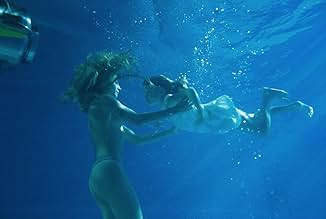Diverses vies convergent sur une île isolée, toutes reliées par un auteur dont le roman est devenu inextricablement entrelacé avec sa propre vie.Diverses vies convergent sur une île isolée, toutes reliées par un auteur dont le roman est devenu inextricablement entrelacé avec sa propre vie.Diverses vies convergent sur une île isolée, toutes reliées par un auteur dont le roman est devenu inextricablement entrelacé avec sa propre vie.
- Prix
- 11 victoires et 18 nominations au total
María Álvarez
- Enfermera
- (as María Alvarez)
Javier Coromina
- Camarero Chiringuito
- (as Javier Corominas)
Alesandra Álvarez
- Luna 1 año
- (as Alesandra Alvarez)
José Ferreira
- Emplastro
- (uncredited)
Avis en vedette
I found this film absolutely terrific. Ik know there's a lot of sex in it and yes, there are a lot of suspicious coincidences, but I looked past that.
For starters, I loved the story, it wasn't boring at all, despite what some may say. It was a sort of twisty fairytale to me, just like 'Los Amantes del Circulo Polàr' was. I love good fairy tales!
The acting was very good by most actors (I love you Najwa!), and good by the others. Even the girl that played Luna was convincing.
The film has a lot of explicit scenes (sexual and non-sexual) but besides from that Médem accomplishes to put a lot of suggestion in it (sexual and non-sexual). If you watch it attentively and past merely what you see, you will notice the subtlety of the characters and story.
Last of all i would like to say that the English title (Sex and Lucia) is an abomination to the original title (Lucia y el Sexo). The word are the same, but the word order has flipped, which gives the title a whole other meaning, to my opinion. The film is about Lucia and the meaning sex has in her life and the life of others. It is not about sex and the way Lucia handles with it. The meaning of film titles is often lost in translation (no pun intended). Why can't American (and other) people keep the original title? We can in Belgium.
A la proxima
For starters, I loved the story, it wasn't boring at all, despite what some may say. It was a sort of twisty fairytale to me, just like 'Los Amantes del Circulo Polàr' was. I love good fairy tales!
The acting was very good by most actors (I love you Najwa!), and good by the others. Even the girl that played Luna was convincing.
The film has a lot of explicit scenes (sexual and non-sexual) but besides from that Médem accomplishes to put a lot of suggestion in it (sexual and non-sexual). If you watch it attentively and past merely what you see, you will notice the subtlety of the characters and story.
Last of all i would like to say that the English title (Sex and Lucia) is an abomination to the original title (Lucia y el Sexo). The word are the same, but the word order has flipped, which gives the title a whole other meaning, to my opinion. The film is about Lucia and the meaning sex has in her life and the life of others. It is not about sex and the way Lucia handles with it. The meaning of film titles is often lost in translation (no pun intended). Why can't American (and other) people keep the original title? We can in Belgium.
A la proxima
(8/10) Refreshing, delightful, sexy. moving and thought-provoking movie from Spain. Not really porn (as the title might suggest) although there is some very artistic explicitness. It is movies like this one that remind us that European cinema can scale the emotional dilemmas and mountains of a story where other films look at a storyline in terms of physical developments. Lucia, a young waitress in Madrid, falls completely in love with a writer. After a period of blissful togetherness, something from his past pulls him in two directions. We are caught up in his moral dilemma, of not wanting to lose the wonderful gift he has found and yet not wanting to be untrue to himself. The semi-autobiographical novel he is writing pulls together the story and the emotions and hopes of the characters and introduces ideas that enable them to heal some of their hurt. A central idea is that of finding a hole (symbolically on the sandy beach) where, after reaching the end of the story, you can jump back into the middle. That way you can try an make things turn out better ("If you give me time", says Lorenzo, Lucia's boyfriend.) A more mature and rounded work than the Director's earlier "Lovers of the Arctic Circle", Sex and Lucia combines wonderful acting, a great story, innovative cinema and spine-tingly beautiful photography. One of my favourite films of the year.
This Spanish film has an unusual look and feel and dares to take chances in the way that it mixes fantasy and reality. The result is an interesting film, which is often confusing and frustrating. I'm sure that this was not entirely accidental and that the filmmakers wanted to keep the audience in a state of disorientation. Nevertheless, the convolutions of the story appear to serve no other purpose than to keep us off balance.
The films biggest sin is the scene in the middle of the film where the daughter Luna opens the bedroom door. The following event is presented in such a way that we are left guessing as to what has just happened. There's no reason for withholding it, except the misguided idea that lack of clarity is artistically valuable. I think that despite it's flaws, this film shows a great vibrancy and energy.
People talk a lot about the sex scenes. The film doesn't have much to say about sex and it certainly isn't about sex. Nevertheless, the scenes do not seem tacked on for the sake of it and, in an era when Hollywood seems to be gripped by a new puritanism, it's refreshing to see a frank depiction of what is, after all, an important aspect of the relationship between these characters.
The films biggest sin is the scene in the middle of the film where the daughter Luna opens the bedroom door. The following event is presented in such a way that we are left guessing as to what has just happened. There's no reason for withholding it, except the misguided idea that lack of clarity is artistically valuable. I think that despite it's flaws, this film shows a great vibrancy and energy.
People talk a lot about the sex scenes. The film doesn't have much to say about sex and it certainly isn't about sex. Nevertheless, the scenes do not seem tacked on for the sake of it and, in an era when Hollywood seems to be gripped by a new puritanism, it's refreshing to see a frank depiction of what is, after all, an important aspect of the relationship between these characters.
Written reality. I had the unexpected pleasure of seeing this soon after Ruiz's Proust. Both about writers creating a life.
Time folding. Narrative layers.
The three sisters from 'Alice in Wonderland,' here named Alsi/Elana, Lucia (the Alice, an anagram, in fact one that Carroll used) and Belin. The story is to Alice, for Alice, about Alice and generates the world that Alice lives in. The lighthouse and hole.
Its less than intelligent in the level of the story: lust drives meaning, but that's because the written novel is at that vulgar level. This film starts slow and ordinary, just as the novel within. But we soon weave all sorts of ambiguous narrative threads, each creating the other. The last half of the film is a bedtime story, a novel, a suicide note, a coma-induced dream, a recipe, an internet communication, a climax-induced hallucination, a blindfolded taste.
A man loves three women. Another man mirrors him. Lots of coupling, ethereal angst,
Two of the sisters plus the author (and his double), all possibly dead (all possibly fictional), on the island of conception. And the story starts again halfway.
Some lightly nuanced direction here. Endearment without cloying. The only thing in this film that is not sensually romantic is that the computer is a PeeCee and not a Mac. You'd think they'd know.
Ted's Evaluation -- 3 of 4: Worth watching.
Time folding. Narrative layers.
The three sisters from 'Alice in Wonderland,' here named Alsi/Elana, Lucia (the Alice, an anagram, in fact one that Carroll used) and Belin. The story is to Alice, for Alice, about Alice and generates the world that Alice lives in. The lighthouse and hole.
Its less than intelligent in the level of the story: lust drives meaning, but that's because the written novel is at that vulgar level. This film starts slow and ordinary, just as the novel within. But we soon weave all sorts of ambiguous narrative threads, each creating the other. The last half of the film is a bedtime story, a novel, a suicide note, a coma-induced dream, a recipe, an internet communication, a climax-induced hallucination, a blindfolded taste.
A man loves three women. Another man mirrors him. Lots of coupling, ethereal angst,
Two of the sisters plus the author (and his double), all possibly dead (all possibly fictional), on the island of conception. And the story starts again halfway.
Some lightly nuanced direction here. Endearment without cloying. The only thing in this film that is not sensually romantic is that the computer is a PeeCee and not a Mac. You'd think they'd know.
Ted's Evaluation -- 3 of 4: Worth watching.
This movie in my view is not understandable without any notion of the 'soul', whose movements are made visible by magnificent underwater shots. The sexual scenery functions not only as entrance to the story; I think Medem really wanted to depict something like 'the ultimate sex' both as experience and as ultimate, divine ideal, something like Goethes 'eternal feminine.' As something to strive for, it can deeply affect our lives by giving it the splendour we need to keep it worthwhile, even if we fail. At the same time, it is also a power deep down, a dark shadow that haunts us. It's for us to see, to accept, and to decide: do we want to go to our island and unite the two, as Lucia does? In that case, we might see that in the end our stories come true as well, be it by breaking in in the middle.
The question I asked myself after watching the movie for the third time was: where exactly is this 'middle' of it? It seems to me that it's around the scene where Elena is walking through Madrid with Luna in her baby carriage, while passing the apartment of Lucia and Lorenzo. From then on, the decisions made by the novelist - like the shivery death of his child - are such that there is no way back. Lorenzo, Lucia and their relationship are too heavily shaken up. Both have to get into a new reality which can transform their personalities; to both, this means a form of dying and leaving their old personalities behind. They surely resist this, especially Lorenzo; but also he has to put himself at risk, following the demands of his 'blood', that is, of his sex, death and rebirth. And there the story takes over the initiative from the writer, who himself is thrown into it - in the middle, where he leaves his home and runs into his 'accident'. Exactly that scene is not shown - it's the hole in the middle, through which the old reality passes into the new.
For me, this movie is a small masterpiece, which shows how film and literature can work together, and how more powerful ideas about ourselves are then the circumstances we are put into. The 'form' of the persons is therefore changeable: like Lorenzo during the last Island episode has 'changed' into Carlos. As the 'transformed' Lorenzo turns up on the island, with his distress and his love for both Elena and Lucia, 'Carlos' is no longer necessary and the women can leave him behind. The fact that Elena is eventually able to weep, marks the acceptance of her loss, which 'naturally' returns her child to her from the middle of the picture again.
The question I asked myself after watching the movie for the third time was: where exactly is this 'middle' of it? It seems to me that it's around the scene where Elena is walking through Madrid with Luna in her baby carriage, while passing the apartment of Lucia and Lorenzo. From then on, the decisions made by the novelist - like the shivery death of his child - are such that there is no way back. Lorenzo, Lucia and their relationship are too heavily shaken up. Both have to get into a new reality which can transform their personalities; to both, this means a form of dying and leaving their old personalities behind. They surely resist this, especially Lorenzo; but also he has to put himself at risk, following the demands of his 'blood', that is, of his sex, death and rebirth. And there the story takes over the initiative from the writer, who himself is thrown into it - in the middle, where he leaves his home and runs into his 'accident'. Exactly that scene is not shown - it's the hole in the middle, through which the old reality passes into the new.
For me, this movie is a small masterpiece, which shows how film and literature can work together, and how more powerful ideas about ourselves are then the circumstances we are put into. The 'form' of the persons is therefore changeable: like Lorenzo during the last Island episode has 'changed' into Carlos. As the 'transformed' Lorenzo turns up on the island, with his distress and his love for both Elena and Lucia, 'Carlos' is no longer necessary and the women can leave him behind. The fact that Elena is eventually able to weep, marks the acceptance of her loss, which 'naturally' returns her child to her from the middle of the picture again.
Le saviez-vous
- AnecdotesSome of the most sexual explicit content was made by doubles, not by the main actors.
- GaffesA full moon between two buildings is shown during midday when Lorenzo meets his daughter Luna for the first time - which is astronomically impossible.
- Générique farfeluCredits scroll in the opposite direction.
- Autres versionsThe US cut removes most of the frontal nudity and runs approximately 2 minutes shorter.
- ConnexionsFeatured in Brows Held High: Room in Rome (2013)
- Bandes originalesUn Rayo de Sol
Written by Daniel Vangarde (as Vangarde), Claude Carrère and Amado Jaén (as Jaen)
(c) Bleu Blanc Rouge Editions Soc - Editions Productions Zagora
Ediciones Musicales Clipper's, S.L.
Meilleurs choix
Connectez-vous pour évaluer et surveiller les recommandations personnalisées
Détails
- Date de sortie
- Pays d’origine
- Site officiel
- Langues
- Aussi connu sous le nom de
- Sex and Lucía
- Lieux de tournage
- sociétés de production
- Consultez plus de crédits d'entreprise sur IMDbPro
Box-office
- Brut – États-Unis et Canada
- 1 594 779 $ US
- Fin de semaine d'ouverture – États-Unis et Canada
- 47 591 $ US
- 14 juill. 2002
- Brut – à l'échelle mondiale
- 7 640 680 $ US
- Durée2 heures 8 minutes
- Couleur
- Mixage
- Rapport de forme
- 2.35 : 1
Contribuer à cette page
Suggérer une modification ou ajouter du contenu manquant




























